ABIGAIL (2024)
After criminals kidnap the ballerina daughter of a powerful underworld figure, they retreat to a mansion, unaware they're locked inside with no normal little girl...

After criminals kidnap the ballerina daughter of a powerful underworld figure, they retreat to a mansion, unaware they're locked inside with no normal little girl...


Abigail is an entry in Universal Pictures’ tribute to its monster-verse classics from the 1930s to the 1950s. Those films were a sometimes-wonderful series of works that began with Dracula (1931) and included some genuinely great films, amongst them Frankenstein (1931), The Bride of Frankenstein (1935), The Son of Frankenstein (1939), and The Wolf Man (1941).
The film’s producers claim their inspiration came from the lesser-known Dracula’s Daughter (1936), the most obscure and suggestive film in the Universal horror canon (due, in part, to its underlying lesbian theme, which necessitated camouflage from the censors of the day). Abigail, though it’s about a vampire’s daughter, is a world away from that.
This film isn’t out to be a creepy movie depicting uncanny events. It’s a full-on modern work in the Grand Guignol tradition, or what we now call splatter horror, gushing out enough slapstick gore to float a cruise ship. An alternative title would be Home Alone with Vampires.
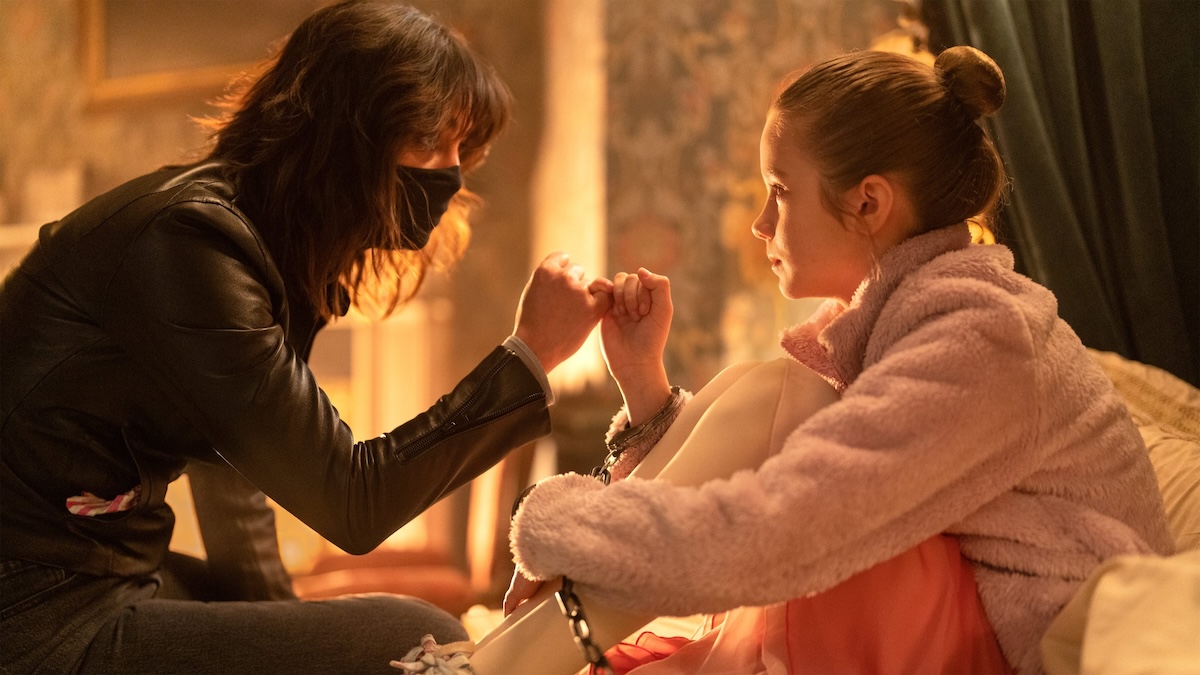
The film opens with the nostalgic strains of Tchaikovsky’s Swan Lake theme, echoing the 1931 Dracula, on the soundtrack. We see 12-year-old Abigail (Alisha Weir) rehearsing for an upcoming ballet in a large, dark, empty theatre, every step en pointe. She seems a perfectly harmless and guileless young girl, even though she moves through life alone and unsupervised.
Meanwhile, not far away, a team of six petty criminals, led by Dean (Dan Stevens), are making preparations to kidnap Abigail. You’ve seen these sorts in a dozen heist films. They come from a variety of criminal backgrounds and are all complete strangers to each other. In a nod to Quentin Tarantino’s Reservoir Dogs (1992), each is given a cute alias, this time taken from members of Frank Sinatra’s Rat Pack.
Just after Abigail arrives home for the night at her large and strangely empty mansion, the gang breaks in and kidnaps her with remarkably little difficulty. They take her to a remote mansion upstate New York, a pleasingly gloomy setting furnished with creepy, perverse Gothic details and artfully shrouded in gloom and shadow. Here, the gang’s mastermind, Lambert (Giancarlo Esposito, playing yet another ultra-smooth criminal), instructs them to hold the girl for 24-hours while he arranges to collect the ransom from Abigail’s hugely wealthy, mysterious father.
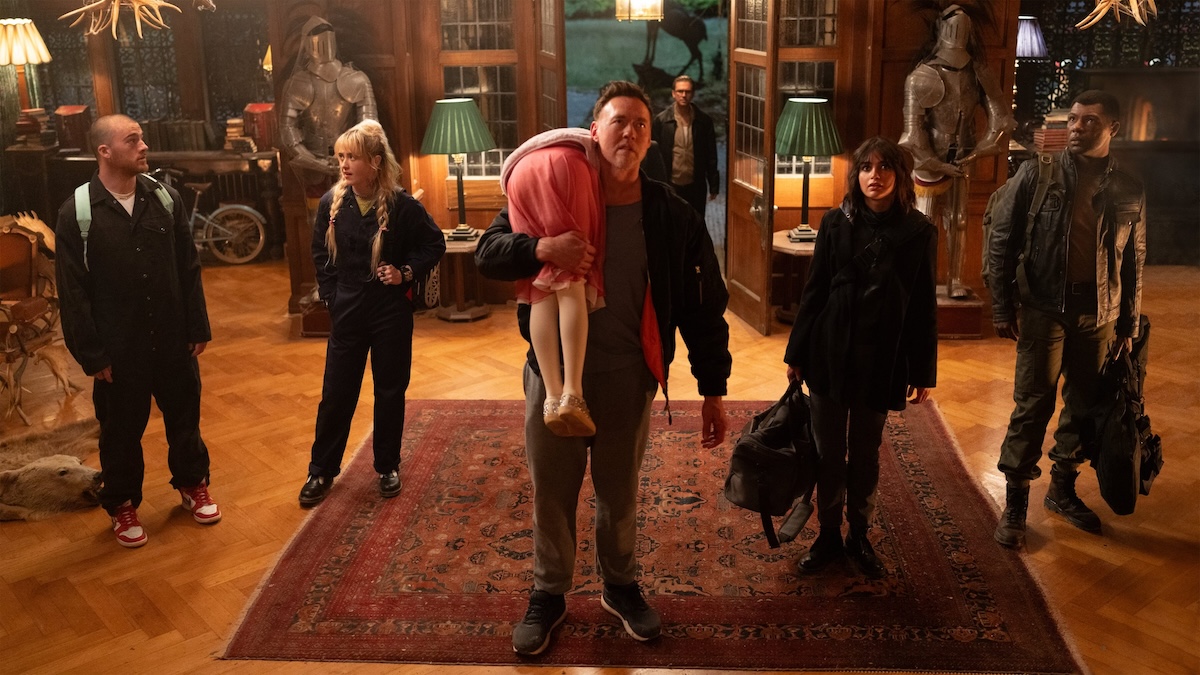
The kidnappers settle in for a long night’s wait. Joey (Melissa Barrera), an ex-army medic and drug addict, takes charge as Abigail’s sole carer and bonds with her immediately. Charming in her helplessness, Abigail melts Joey’s heart, leading her to remove the girl’s blindfold and undo her handcuffs—a major, albeit predictable, error. At this point, Abigail’s mask of innocence falls away, revealing the bloodthirsty demon within. The little ballerina embarks on a literal rampage—heads from bodies, limbs from limbs—as she hunts down the kidnappers one by one. She is not their victim. She is their predator, and they are her prey.
Child horror, of which this is one example, can produce great chills. I’ll always remember the little girl’s transformation into a zombie in Night of the Living Dead (1968) with a fond shudder; along with the shiny-eyed, pre-teen aliens who invaded The Village of the Damned (1960). But those were at least somewhat serious films, whereas Abigail is a comedy. Little Abigail is too much of a jack-in-the-box to be very scary, despite Ms Weir’s graceful physique and superb athleticism.
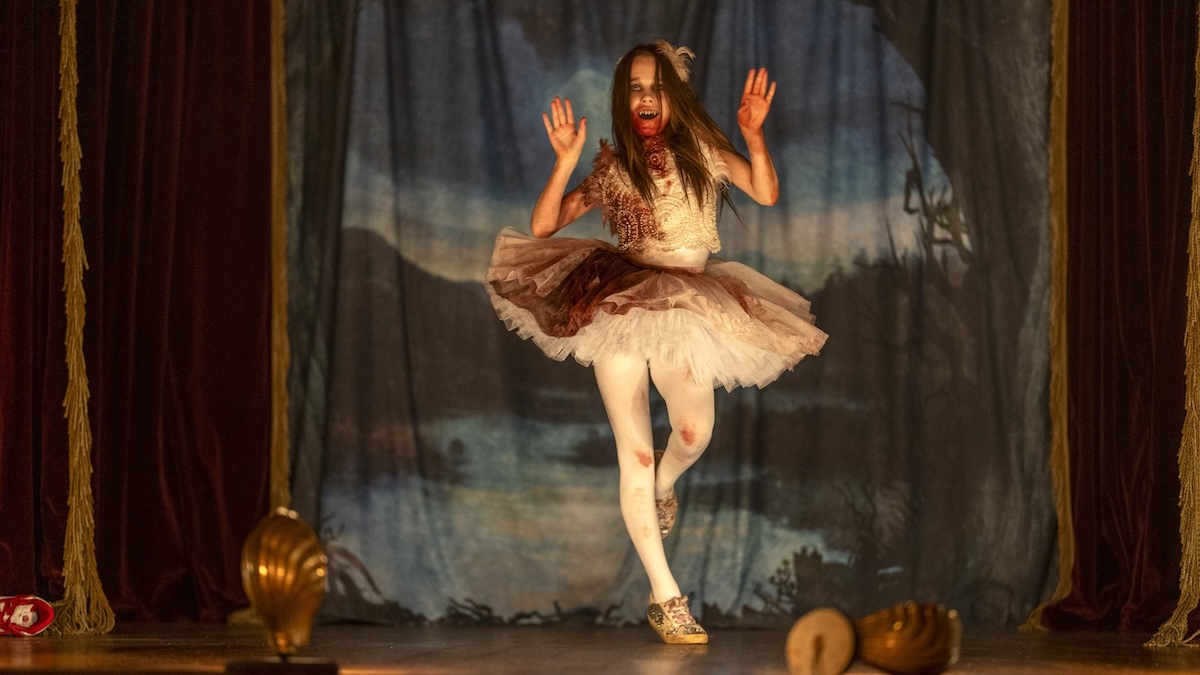
Abigail is certainly well-produced. Aaron Morton’s dark-hued cinematography keeps the lighting low to create a world of shadows, where what you don’t see is supposed to be scarier than what you do. Susie Collin’s production design and Shane McEnroe’s art direction also recapture some of the eerie atmospheres of the Universal classics.
The actors approach their roles with admirable zeal, considering the material. Kevin Durand (The Strain) provides solid backing as the gang’s musclebound member, while the late Angus Cloud shows great potential as the gang’s psychopathic, idiot savant getaway driver—the seediest and most dangerous of the bunch. I liked his offbeat mix of mumbling and avoidance, along with his shifty little eyes.
It’s disappointing that screenwriters Stephen Shields and Gary Busick, along with directors Matt Bettinelli-Olpin and Tyler Gillett (Scream), have taken a different approach from the classic Universal monster movies. The script offers superficial character development, weak backstories, predictable plot developments, and attempts at wisecracking humour that would be better suited to 1980s Arnold Schwarzenegger films. The directors attempt to ramp up the tension with jump scares, which are effective initially but lose their impact as the film progresses.
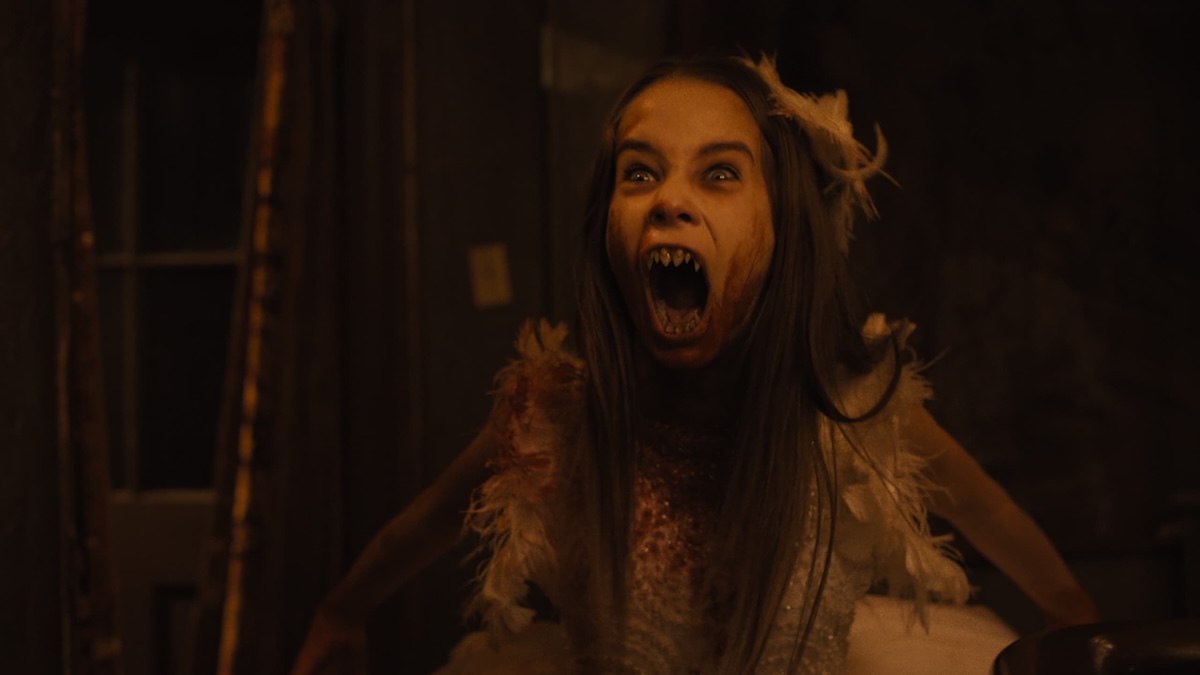
Abigail is a modern, explicit splatter horror, closer to the British tradition of showing everything that Hammer Studios made famous. This film is out to outdo Hammer, George Romero, Sam Raimi, and anyone else in the genre. It’s like a competition to see how far it can push the boundaries with ripped flesh and gushing fountains of blood, featuring amputations and decapitations. I was less scared and left wondering more about the special effects—how did they get so much blood to spurt out of one character’s mouth? You also get bodies bursting like balloons filled with stewed tomatoes, while another unfortunate victim ends up swimming in a vat of Abigail’s leftover meals.
Audiences who are truly bothered by explicit violence, even when it’s obviously comedic, will avoid Abigail sight unseen. Those seeking a more dramatic, suggestive, or indirect approach to horror will scoff at its obviousness. That leaves gorehounds, a truly niche audience, who will appreciate this the most. For them, Abigail will succeed beyond expectations as splatter horror continues its quest to find ever more grotesque ways to dispatch its hapless victims. What will they think of next?
IRELAND • USA •CANADA | 2024 | 109 MINUTES | 2.93:1 | COLOUR | ENGLISH

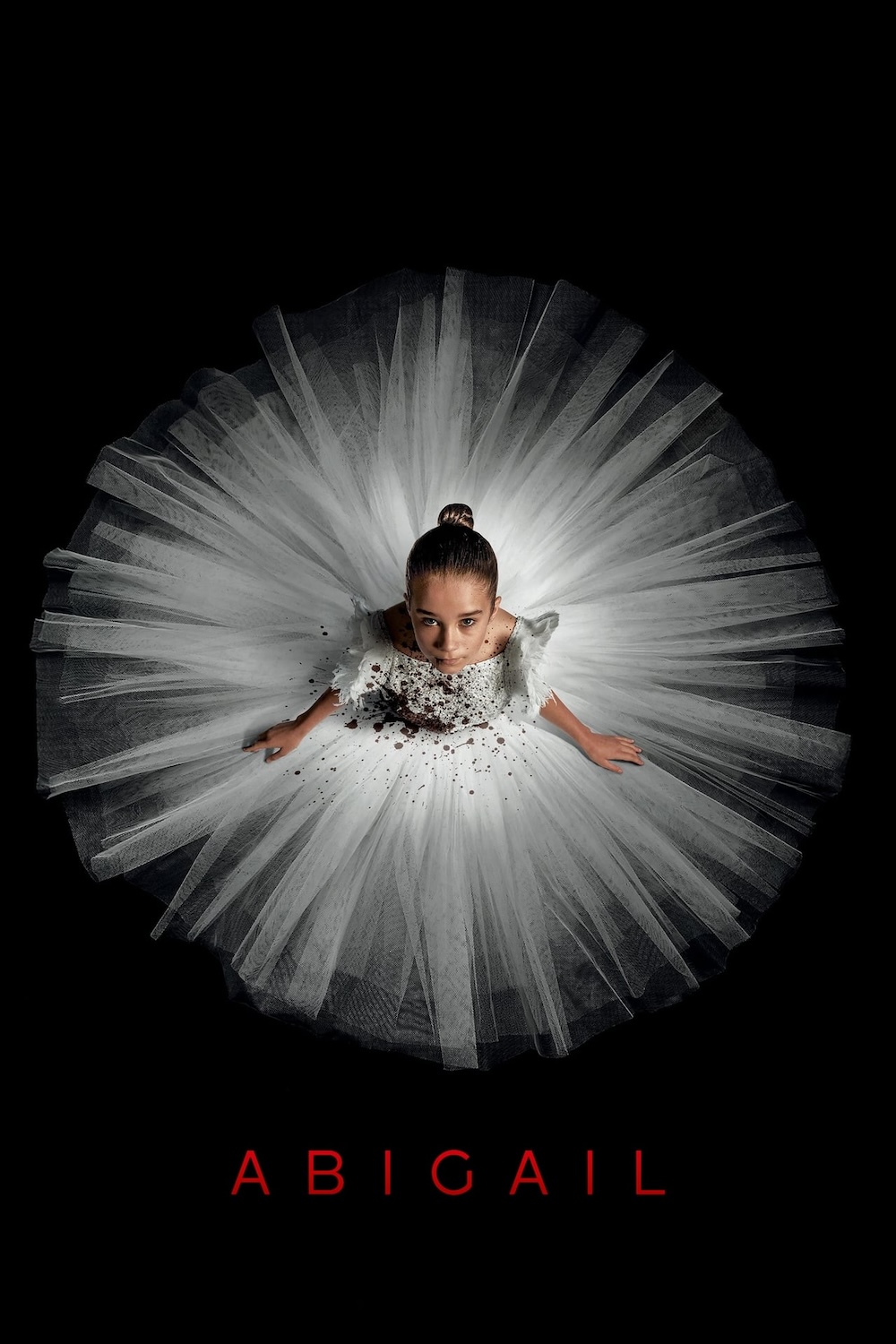
directors: Matt Bettinelli-Olpin & Tyler Gillett.
writers: Stephen Shields & Guy Busick.
starring: Melissa Barrera, Dan Stevens, Kathryn Newton, Will Catlett, Kevin Durand, Angus Cloud, Alisha Weir & Giancarlo Esposito.
